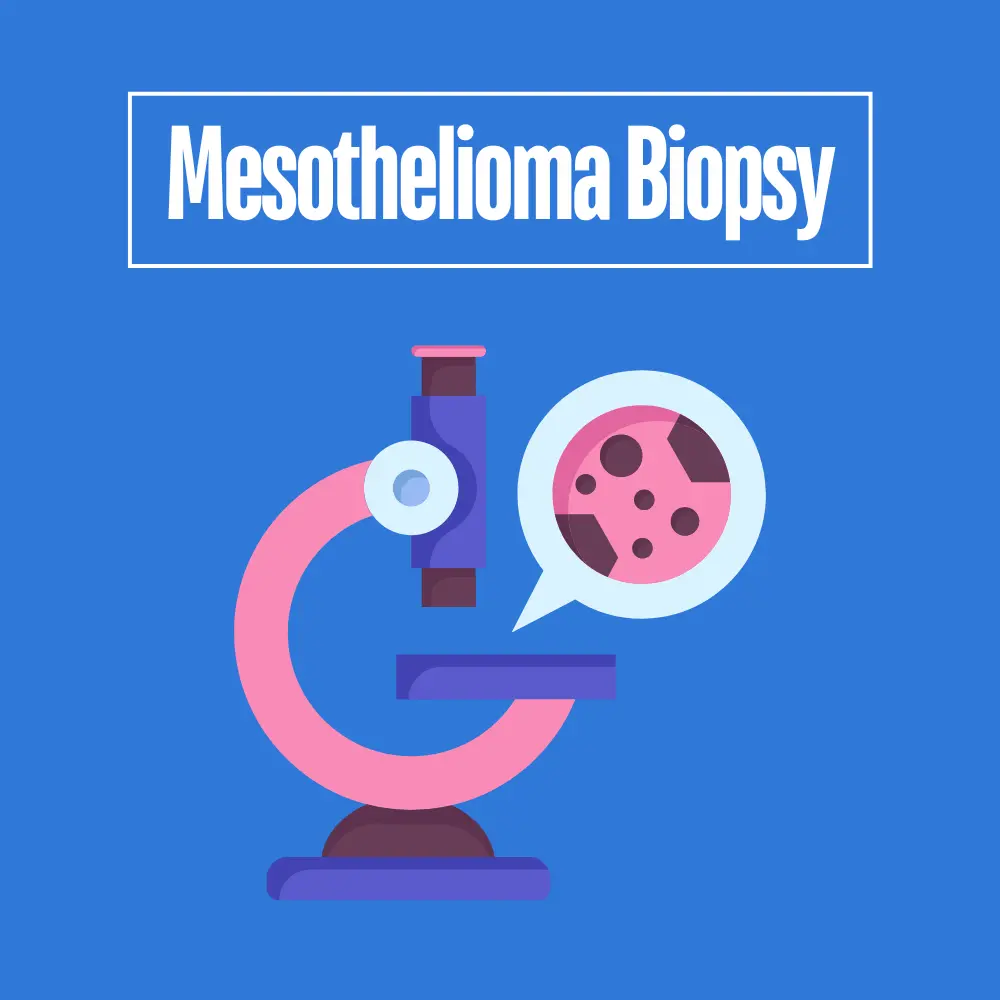A biopsy in general can be defined as a procedure to remove a piece of tissue or a sample of cells from your body so it can then be tested in a laboratory. A mesothelioma biopsy takes place when a sample of tissue is taken from a mesothelioma patient for a pathologist to examine. A mesothelioma biopsy is needed to make an accurate diagnosis and is currently the only way to truly confirm a diagnosis of mesothelioma.

Usually, before a patient has a mesothelioma biopsy, there are a variety of steps that take place. A person may begin to experience symptoms of mesothelioma, such as shortness of breath, cough, and fatigue and they may go to their primary care doctor. The primary care doctor can take an X-ray for any abnormalities in the lungs. The usual next step is to get imaging scans, such as a CT-scan or MRI to determine if there is fluid and/or scarring in the lungs. If there is evidence that a patient may have an asbestos-related disease then the final step would be to perform a biopsy to confirm a diagnosis, and whether a tumor is malignant or nonmalignant.
Types of Biopsies
There are different types of biopsies that can be taken. There are tissue biopsies and fluid biopsies. However, when it comes to diagnosing mesothelioma, the only way to get an accurate diagnosis is to use a tissue biopsy.
A mesothelioma biopsy is not only helpful to confirm a diagnosis, but it also can help determine the cell type of mesothelioma. There are three mesothelioma cell types. They include:
- Epithelioid
- Sarcomatoid
- Biphasic
Epithelioid is the most common type of mesothelioma and is usually easier to treat than the other cell types, because the cancerous cells tend to spread more slowly than they do for the other types. Sarcomatoid is the least common of the three cell types of mesothelioma and is thought to be the most difficult to treat and the most aggressive. Sarcomatoid cells are spindle-like in shape. Biphasic mesothelioma is a combination of both epithelioid cells and sarcomatoid cells.
A needle biopsy usually takes place while the patient is awake. The cancerous tissue is extracted with a needle and an ultrasound and other imaging scans can be used to determine where the needle should be placed into the body. If a needle biopsy cannot confirm a mesothelioma diagnosis, then a surgical mesothelioma biopsy may be performed.
There are many different types of surgical camera-assisted biopsies that are used for mesothelioma patients. Some of these biopsy techniques that are commonly used include laparoscopy and thoracoscopy.
Laparoscopy For Mesothelioma Biopsy
A laparoscopy is a surgical procedure that examines the organs in the abdomen. A laparoscopy implements a tube with a light on it, called a laparoscope, that also holds a video camera. The laparoscope is placed into an incision in the patient’s abdomen. This is a minimally invasive surgical procedure. A sample of the patient’s tissue may be removed for analysis. Since peritoneal mesothelioma begins in the lining of the abdomen, this biopsy technique is usually used on peritoneal mesothelioma patients.
Thoracoscopy For Mesothelioma Biopsy
A thoracoscopy is a surgical procedure that is performed to look at the space inside the chest. A thoracoscope, which is a lighted tube with a video camera on it, is inserted into an incision between the ribs. This is typically done for those with pleural mesothelioma.
In conclusion, a mesothelioma biopsy taking the tissue from a patient suspected to have mesothelioma is the only way to truly confirm a mesothelioma diagnosis. Imaging scans may be used to support a mesothelioma diagnosis or to help determine treatment options.
If you or a loved one has been diagnosed with mesothelioma or another asbestos-related disease, please call us at (800) 505-6000 or fill out our simple contact form. Our website is filled with information for victims of mesothelioma victims in Pennsylvania.
Sources:
https://www.mayoclinic.org/diseases-conditions/cancer/in-depth/biopsy/art-20043922
https://www.hopkinsmedicine.org/health/treatment-tests-and-therapies/laparoscopy
https://www.cancer.org/cancer/diagnosis-staging/tests/endoscopy/thoracoscopy.html